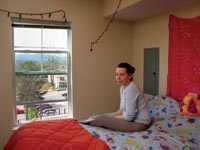In the ground-floor community room of the recently completed Griffin Apartments, a handful of residents sit around a table. Ranging widely in age, race, background and lifestyle, what they have in common is a need for affordable housing in downtown Asheville.

“I saw an ad in the Iwanna, and it was, like, ‘Cool! There’s a cheap place to live downtown,” says 21-year-old Asheville native Michael Moody, who works at Home Depot, before heading off to help a band he manages prepare for a gig.
Laura Mae Huff returned to Asheville from Florida to be near her family. The 89-year-old has been in the building three months and often takes charge of the community parties and dinners held here.
“I like it very much,” she says quietly.
The rest of the group seems to share that sentiment. The setup at the Griffin encourages a sense of community; the community room and other amenities help ensure that neighbors in the four-story building on Grove Street cross paths. A library/computer room and fitness area are also planned.
“We have a great community, and we like people to be part of that community,” says building manager (and resident) Nile Faulkner.
The Griffin is Mountain Housing Opportunities’ flagship downtown complex, built by the local nonprofit to provide affordable rental units in the city center. The building’s 50 apartments are offered for unheard-of rents: Efficiencies cost $203 per month; one-bedroom apartments rent for $397 to $468 per month; and two-bedroom units go for $518 per month.
Affordable but not “low-rent”
Dozens of ceramic angels and family portraits decorate Huff’s living room, along with fancy curtains and antique-flavored furniture. A Griffin apartment is a blank slate for tenants to enhance, and Huff has put her touch on every corner of her place. Picking up framed photos, she talks about the various family members she now lives near.
Two floors up, 22-year-old Jessica Sluder‘s room looks more like a college dorm, albeit a very tidy one, with stuffed animals on the bed and Johnny Depp posters on the walls. One of the building’s first tenants, she chose this unit for its view of downtown. But unlike a dorm room, the sounds of neighbors don’t come booming through thin walls.
“A lot of apartments, you can hear everything going on,” she notes. “In here, you can’t hear anything.”
Down the hall is an upstairs community room with windows on three sides, which Faulkner says will soon become the library and computer room. Another door leads to a line of closets providing extra storage. The hallways keep going, lined by apartment doors and winding around to the elevators. “They got an awful lot of housing on a small lot,” she observes.
Safety and numbers

For some residents, the complex marks the first time the words “affordable” and “safe” have ever simultaneously applied to their living arrangements. Partly fenced and with access restricted to tenants and their guests, the building sits securely in an area with a somewhat questionable reputation.
“This specific building, it’s away from all that,” says David Moscarelli. Though he has to go outside for a cigarette (the whole building is nonsmoking), he says the benefits outweigh the inconvenience. “The qualifications for getting into this place were pretty tough, but once you get in, it’s pretty great,” he says.
Applicants have to clear credit and criminal checks before they’re allowed to even see an apartment. Besides keeping bad seeds out of the building, the approval process reduces turnover, notes Faulkner. Prospective tenants must also meet specific income guidelines.
But the Griffin management had no trouble finding residents. MHO began getting calls as soon as construction was announced, and all 15 efficiencies and 15 one-bedroom units were snapped up as soon as applications could be processed. Only five of the 20 two-bedroom units are still available (including one designed to be wheelchair-accessible), and there’s a waiting list for other apartments, says Faulkner.
“If I had another hundred one-bedrooms and 500 efficiencies, they would rent,” she says.
But achieving that kind of volume downtown may be a tall order, notes MHO Executive Director Scott Dedman. The high cost of land, plus strong community resistance to new tall buildings, would make such a project hard to pull off. MHO got lucky with the Griffin, says Dedman, in that the nonprofit acquired the property before bids from private developers had inflated its cost.
“We got a reasonable price on that land; that’s what made it all work,” he explains. “We could not have afforded it if it were on the open market.”
Some in the community encouraged MHO to make the building taller, but opponents persuaded the group to hold the line at 50 units.
“There is a raging antidevelopment sentiment that sometimes opposes development anywhere,” says Dedman, adding, “Those who believe that opposing all development downtown is progressive and environmentally sound are wrong on both counts.” Blocking high-density construction downtown, he argues, forces housing into outlying areas, increasing traffic problems and making it harder for workers without cars to get to jobs in the central business district.
On the upside, the city has apparently recognized the need for higher-density zoning, creating a new classification, the “urban place district,” in 2005. When living spaces can be built closer together and buildings can be taller with a smaller footprint, the cost per unit can come down, notes Dedman.
Although the new district wasn’t used for the Griffin, he says it “has made all the difference in allowing affordability.”
Still, the nonprofit may have to adapt future downtown projects to offset higher costs, perhaps partnering with private developers or exploring mixed-use and mixed-income developments.
Dedman hasn’t ruled out the possibility of another piece of prime downtown real estate falling into MHO’s lap, either.
“Any property owner in downtown or near downtown that wants to help us make a good thing happen, we would be happy to talk to them,” he notes.
For more information on the Griffin Apartments and other Mountain Housing Opportunities properties, call 254-4030 or go to mtnhousing.org



Before you comment
The comments section is here to provide a platform for civil dialogue on the issues we face together as a local community. Xpress is committed to offering this platform for all voices, but when the tone of the discussion gets nasty or strays off topic, we believe many people choose not to participate. Xpress editors are determined to moderate comments to ensure a constructive interchange is maintained. All comments judged not to be in keeping with the spirit of civil discourse will be removed and repeat violators will be banned. See here for our terms of service. Thank you for being part of this effort to promote respectful discussion.